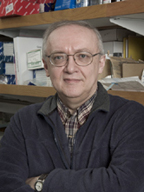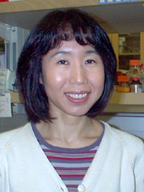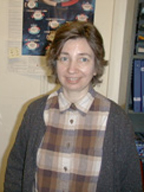 |
Joe
Beavo
Professor - Joe's graduate training was with Earl Sutherland and Joel
Hardman at Vanderbilt University. He moved on to do postdoctoral work
with Ed Krebs at UC Davis and eventually moved to the University of
Washington as an Asst Professor.
Current Research Interests: Regulation and function of
cyclic nucleotide phosphodiesterases. Cyclic nucelotides
regulate
many signaling pathways in tissues throughout the body. Our
research
group studies phosphodiesterases (PDEs), the enzymes that break down
cyclic
nucleotides. Regulation of PDE function can cause dynamic
changes
in cyclic nucleotide levels in cells. One group in the lab
focuses
on determining the physiological roles of each PDE in the tissues where
it is expressed. Another group has interests in determining
the crystal and NMR structures of the various domains of the PDE and
how these structures relate to function and regulation. For specific
examples of the types of projects we
work on, please see the short descriptions of student research below.
CV
of Joseph Beavo
|
 |
Sergei
Rybalkin
Res. Ass. Professor - Current Research Interests - Cyclic nucleotides mediated modulation of myocardial and smooth muscle responses. Molecular and physiological mechanisms of regulation of cGMP-hydrolyzing phosphodiesterases, PDE1s and PDE5, in the cardiovascular and immune systems.
|
 |
Tom
Hinds
Description Coming Soon
|
 |
Masami
Shimizu
Postdoctoral Fellow - Current Research Interests: I just returned to
the lab recently after a 3 year leave to be at home with my new son,
Stephen. I am interested in the roles of PDEs in liver function and
also in olfaction. I am also interested in utilizing immunocytochemical
localization as a tool to determine what physiological functions are
played by different PDEs in a particular cell type of a tissue.
|
 |
Irina
Rybalkina
Research Technician - Current Research Interests: Structure/function
relationships among different selective inhibitors of
phosphodiesterases.
|

|
Xiaoying
Zhang
Postdoctoral Fellow- Current research interests: the role of PDE8A in
M-CSF dependent macrophage differentiation and activation. PDE8A
inhibitor and PDE8A knock-out mice have been used in this study. My
recent data suggest PDE8A inhibition might exert pro-inflammatory
effects on M-CSF dependent macrophage differentiation and activation.
The mechanisms of this pro-inflammatory effect may be of clinical
importance. Tumor associated macrophages, which have anti-inflammatory
characteristics, have been implicated in promoting disease progression.
The conversion of these macrophages, by PDE8A inhibitor treatment, to a
more inflammatory phenotype may be one step towards reducing
pro-cancerous factors in the tumor microenvironment.
|
 |
Lisa
Tsai
Graduate Student - Current research interests; Roles of PDE8s in
Steroidogenesis. We have recently shown that one specific isozyme of
PDE, PDE8A, is an important regulator of LH induced testosterone
regulation in Leydig cells. My current project is to determine if a
similar regulatory mechanism is also present for corticosterone
production by adrenal fasiculata cells. I am ustilizing both selective
inhibitors of PDEs as well as animals having the PDE8 genes knocked out
as tools to address this problem. I am also interested in utilizing
fluoresence resonance energy transfer (FRET) as a means of visualizing
and measuring cAMP in intact cells.
|
 |
Steve
Kraynik
Graduate Student - Current Research Interests: I am currently
developing the methods to test the hypothesis that PDE8 is a regulator
of lipolysis by isolated brown fat cells. I am also interested in
looking at the roles of this PDE in fat cell differentiation. My
preliminary studies suggest that PDE8 may be a particularly important
regulator of brown fat metabolism.
|
 |
Angie
Hertz
Graduate Student - Current Research Interests; I am studying the
role(s) of cAMP and PDEs in the control of monocyte differentiation
into macrophages. Recent array data suggests that cAMP increases due to
PDE4 inhibition can have a PROinflammatory effect in this cell system.
Much of this is dues to increased chemokine secretion. As this has
rather major implications for the use of PDE4 inhibitors as
anti-inflammatory agents my current work is focused on determining in
two different mouse models if addition of a chemokine antagonist to a
PDE4 inhibitor will increase the efficacy of the PDE4 inhibitor in
vivo. The current model is a high fat diet induced insulin resistance
model. Since inflammation is a major aspect of control of insulin
sensitivity, we expect this model to be a good one for adult onset
diabetes.
|
 |
Candace
Parchen
Graduate Student - Current Research Interests; Roles of PDE5 effects on
dystrophic cardiac muscle. I am interested in how cGMP and selective
inhibitors of PDE5 regulate cardiac muscle hypertrophy. Our most recent
data strongly suggests that treatment of dystrophic mice with
sildenafil will prevent and even reverse the negative cardiac
impairment seen in the dystrophic mouse. I use a number of non-invasive
methods for monitoring heart function including echocardiography.
|
 |
Claude
Beltejar
Graduate Student - Current Research
Interests: The use of phosphodiesterase inhibitors as cancer
therapeutics. I'm interested in the cyclic nucleotide signaling
regulation of myeloid derived suppressor cells. In the tumor
microenviornment , these cells may promote tumor progression by
preventing the immune system from eliminating cancerous cells.
Molecules that interupt cyclic nucleotide signaling involved
in
promoting this immune suppresive phenotype could be utilized as
therapeutics.
|
 |
Shannon
Nangle
Description Coming Soon.
|
